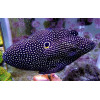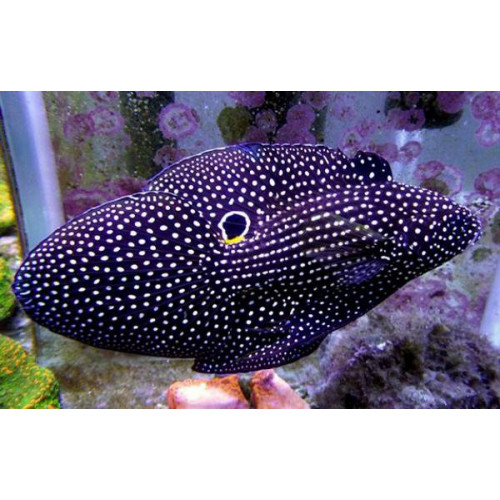Species Name : Calloplesiops Altivelis
Care Level : Easy
Temperament : Peaceful
Color : Black, White
Diet : Carnivore
Reef Compatible : Yes
Water Conditions : sg 1.020-1.025, 72-78° F, dKH 8-12, pH 8.1-8.4
Max. Size : 8»
Origin : Fiji, Indonesia
Family : Plesiopidae
Minimum Tank Size : 50 gallons
The Comet or Marine Betta (Calloplesiops Altivelis) is a species of reef-associated tropical marine fish in the longfin family Plesiopidae.
Calloplesiops Altivelis are dark brown to black in color with a single white spot on the scales. The white spots are found on its body, head and fins, except for the median and pelvic fins which have small blue spots and are lacking scales. The pectoral fin is clear with visible, yellow rays. Located at the base of the last dorsal rays is a black ocellus. It is a hardy and disease-resistant fish.
A predator by nature, it assumes a "head down" position, with its false "eye spot" near the tail resembling the head of a moray eel. Because many predators go for the head in order to incapacitate their prey, the eye-spots on the posterior part of the body may serve to deflect such attacks to the less vulnerable tail region.
Adults of this species can be housed in a species tank as small as 30 gallons, although an aquarium of 50 gallons or larger would be preferable. It is nocturnal and requires hiding places to provide it shelter from bright lighting, being more active at dusk.
The Marine Betta is not commonly kept in a reef-style aquarium, but it is reported to be safe with corals and anemones, however, it will eat all small fish and shrimp. Marine Bettas will only show aggression towards the fish species they are hunting to eat. That means they will only be aggressive towards species that can fit into their mouth.
Marine Bettas are a carnivorous species that prefer to hunt and kill their own food. When first introduced into the aquarium, live saltwater feeder shrimp should be used to entice this fish to eat. Using live foods such as feeder fish or shrimp will help it adjust. Once acclimated, it can be fed meaty foods and frozen preparations 2-4 times weekly.
Size: Small; 1-1/2" to 2-1/2" Small/Medium; 2-1/2" to 3" Medium; 3" to 4" Medium/Large: 4" to 5"; Large; 5" - 6"
-
There are no reviews for this product.
-
No questions yet
Tags: Fishes


